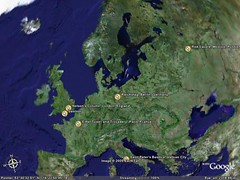After yesterday's EU bashing in this blog it is time to praise our way of living. I got some help for this yesterday evening by attending a lecture of Jeremy Rifkin. Rifkin is a world-wide recognised economist behind books such as Age of Access and End of Work. As a result of his latest book - European Dream - he has been flown to Europe several times to praise our way of living.
Rifkin's message is as follows:
- The American dream is not doing too well
- Europeans have always had a dream but they haven't been aware of it
- Even with all its problems the European Union is an achievement one should be proud of
- There are clear differences between the dreams. We should learn from each other
- While the American concept of freedom is about autonomy, on this side of the Atlantic the same phrase refers to quality of life, inclusion and building peace
- By combining American personal accountability and optimism with European inclusivity and solidarity we would achieve a better world
I must admit that I was quite sceptical on the way to the event. I found it a bit too easy to come and praise to the believers. But I genuinely liked Rifkin. He is a magnificent speaker. He knows his figures, he is not a one-liner speaker, he is amusing and also critical towards Europe. He is not like Michael Moore who gains popularity by mocking his nation.
Rifkin's best feature is optimism. He was very correct when pointing out that Europeans should have more self-esteem in their project. The achievements on this continent are unique in world history. The European Union is the biggest experiment ever of a political union not created using violence.
Of course he generalises, speaks mostly about Western Europe etc. It is all so easy to show the weak points in his message. But then you clearly miss the core: Europe is something you can be proud of. One should not be arrogant but value what we have achieved.
Rifkin also managed to show the weak points of Europe. It was refreshing that he was not talking merely about economics but also about literacy, poverty and quality of life. He is a preacher of caring and solidarity. Rifkin stated that we need to create incentives for fertility (better parental benefits) and multiculturalism (we need to make the new Europeans feel welcome). He asked - with no irony - why the old Kennedy slogan with slight modification could not work here as well:"Don't ask what Europe can do for you. Ask what you can do for Europe." I really liked his suggestion that there should be incentives for us - the ERASMUS generation - to spend time working for the community.
In the end someone asked him the obvious question:"Mr. Rifkin, all this is nice but how shall we do this?" I liked the fact that he answered by talking about the dream. He also looked the young man asking the question in the eyes and said that the solution is up to you.
As a friend of mine said on the lift after the lecture:"This is the book that should be in hotel rooms across Europe."
Mitä Euroopan pitäisi nyt tehdä
6 days ago













5 comments:
I think a very crucial point in Rifkin's argumentation was that one should not see the excellence of the European dream arrogantly because there are many things in it that are not as they ought to be. Like immigration, outsourcing of responsibility and fertility.
I have had the book for quite many months but I have never even opened it. I think I will save it for Christmas holidays or so.
What does Rifkin mean with "outsourcing of responsibility"? Is this an euphemism for Balkan, Iraq and Israel?
Jaakko
Well, what needs to be stated to begin with that I am not Rifkin and therefore I can only give my interpretation of his lecture. What also needs to be mentioned is that I have not read the book.
What I understood and also related with was the common European way of blaming the government for misfortunes. Before you start calling me a right-wing fellow (have a look at the next post), I think he means that our welfare society has made it relatively easy to not take responsibility. This is not only linked to misfortunes but also to let´s say environmentally hazardous actions. More on the same subject in Tom Bentley´s Everyday Democracy (www.demos.co.uk)
Ok, so it is "outsourcing of responsibility" on the individual level rather than on a national or even "european" level?
I'm not Rifkin either, have not read the book and have not even attended a lecture, but that reeks a bit like an oversimplification. Not that there isn't (more than) a grain of truth in it, but still.
Jaakko
I think it was Ulrich Beck who has said that there may be a time when the big government and strong welfare state reaches a level where it start to influence personal entrepeneurship and ambition negatively.
Post a Comment